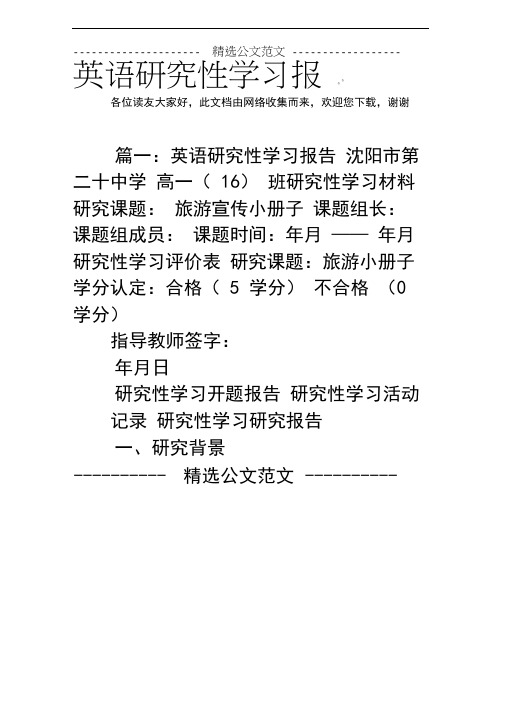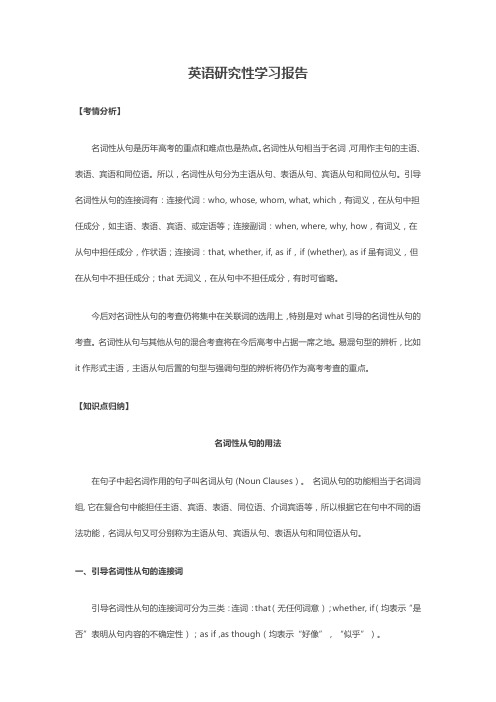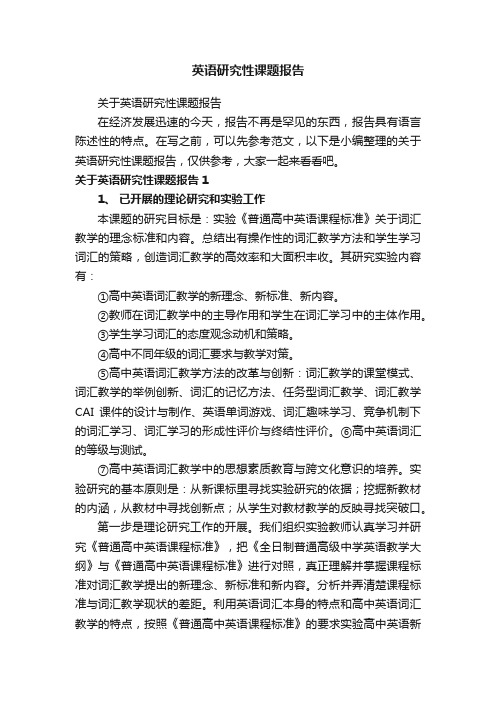英语研究性学习报告范文
英语研究性学习总结

英语研究性学习总结在我学习英语的路上,研究性学习无疑是我成长最快的方式之一。
研究性学习是指根据自己的兴趣和研究目的,选择一个话题进行系统性、深入地了解和探索的过程。
在这个过程中,我通过阅读各种书籍和论文、听取专家讲座和将所学应用到实际的情境中,不断加深对英语知识的理解和掌握,得到了长足的提高。
第一步,选择话题。
研究性学习需要有明确的目的和方向。
我首先会根据自己的兴趣和需求选择一个话题,比如“美国总统选举”,“英国文化”,“语法规则”等。
选择一个自己喜欢的话题会让学习更加有动力和热情,也有助于提高学习效果。
第二步,阅读相关文献。
在确定好话题后,我通常会查找相关的英语书籍、期刊、新闻报道和网站等。
这些资料会对我深入了解话题提供帮助。
在阅读过程中,我也会自己总结笔记或者记录下重要的信息和感悟,以便后续的阅读和论文写作。
第三步,听取专家讲座。
为了更好地理解话题和分享研究成果,我会听取专家或者同行的讲座和演讲,这些讲座能让我从不同的角度看待话题,也有助于和其他同学进行学习和交流。
第四步,应用所学到实际。
在掌握足够的理论知识和背景材料后,我会将所学到的知识应用到实际的情境中,比如用英语参加演讲、在外国网站和社交媒体上和其他人交流、通过视频和语音等方式练习说英语等等。
通过这种方式,我不仅可以检验自己的经验和知识,也能够检验自己的英语表达能力和理解能力,并及时纠正自己的不足之处。
总之,通过研究性学习,我不仅改进了英语的理解和掌握能力,也能够更好地应用所学到实际情境中。
我相信,只要坚持不懈地进行研究性学习,我的英语水平一定会更加出色。
综合素质评价英语研究性报告范文

综合素质评价英语研究性报告范文Research Report on Comprehensive Quality Evaluation in EnglishI. IntroductionIn recent years, comprehensive quality evaluation has become an important focus in education, aiming to evaluate students in a more holistic and multidimensional way. In this research report, we will focus on the evaluation of students' English proficiency as a component of comprehensive quality evaluation.II. BackgroundEnglish is increasingly recognized as a global language, and proficiency in English is seen as an important skill for students in the information age. As a result, evaluating students' English proficiency has become essential in education. Traditionally, English proficiency has been evaluated through standardized tests such as TOEFL, IELTS, and CET. However, these tests only measure certain aspects of language proficiency, such as reading, writing, listening, and speaking. They fail to evaluate other important components of language learning, such as critical thinking, creativity, and cultural awareness.III. Research ObjectivesThe main objectives of this research are:1. To explore the different aspects of language proficiency that should be included in the evaluation of students' English proficiency.2. To identify the most effective methods for evaluating students' English proficiency in a comprehensive way.3. To provide recommendations for improving the evaluation of students' English proficiency in the context of comprehensive quality evaluation.IV. MethodologyIn this research, a mixed-methods approach is used, combining quantitative surveys with qualitative interviews. The participants in the study are students from different grade levels in a high school in China. The quantitative survey is designed to collect data on students' perceptions of the current methods used to evaluate their English proficiency, as well as their opinions on what aspects of language proficiency should be included in the evaluation. The qualitative interviews are conducted to gather more in-depth insights into students' experiences with English learning and evaluation.V. FindingsThe findings of the research reveal that students believe that the current methods used to evaluate their English proficiency focus too much on reading and writing skills, while neglecting other important aspects of language learning, such as speaking and critical thinking. Students also express a desire for more feedback on their language proficiency and opportunities to practice their English skills in real-life contexts.VI. RecommendationsBased on the findings of the research, the following recommendations are proposed to improve the evaluation of students' English proficiency in the context of comprehensive quality evaluation:1. Include a wider range of language skills in the evaluation, such as speaking, listening, and critical thinking.2. Provide more opportunities for students to practice their English skills in authentic contexts, such as group discussions, debates, and presentations.3. Offer more personalized feedback to students on their language proficiency, highlighting their strengths and areas for improvement.4. Involve students in the evaluation process, allowing them to participate in setting goals for their language learning and evaluating their own progress.VII. ConclusionIn conclusion, the evaluation of students' English proficiency should be more comprehensive and multidimensional, taking into account a wider range of language skills and providing students with more opportunities to practice and receive feedback on their English skills. By implementing the recommendations proposed in this research, educators can improve the evaluation of students' English proficiency in the context of comprehensive quality evaluation, ultimately helping students to develop the language skills they need to succeed in the information age.。
英语研究性学习报告_0

--------------------- 精选公文范文------------------ 英语研究性学习报告告各位读友大家好,此文档由网络收集而来,欢迎您下载,谢谢篇一:英语研究性学习报告沈阳市第二十中学高一(16)班研究性学习材料研究课题:旅游宣传小册子课题组长:课题组成员:课题时间:年月——年月研究性学习评价表研究课题:旅游小册子学分认定:合格(5 学分)不合格(0 学分)指导教师签字:年月日研究性学习开题报告研究性学习活动记录研究性学习研究报告一、研究背景---------- 精选公文范文----------通过研究旅游的内容,加强对英语单词的理解,加强阅读理解,同学们在英语的学习中找到乐趣。
各个国家不同的文化,让同学们更加近距离的了解世界。
通过“网上旅游”、在网上找些相关资料,查找自己喜欢的国家,也能培养我们对这些国家的喜欢。
提升我们的价值观,让我们更加憧憬那个地方并为之而奋斗。
二、研究目的和意义通过上网查找,小组间的相互讨论,了解各个国家的风俗习惯,因为我们组研究的大多是欧洲国家,所以能够认识到中西文化差异。
更好地了篇二:英语研究性学习结题报告英语研究性学习结题报告课题名称:黄中学子英语学习概况及如何建立班级:高二(1)班小组成员:张浩高孟侠李金榜张文强王粟王丹指导教师:杨敏歌2012年5 月3 日 ------------ 精选公文范文----------------------研究性学习结题报告第一部分:有关情况说明及课题研究过程一、课题名称:黄中学子英语学习概况及如何构建理想英语课堂二、课题组成员:张浩、李金榜、高孟侠、张文强、王粟、王丹三、课题指导师:杨敏歌四、立题的背景:英语是当今世界上适用范围最广的语言之一。
为改善当前英语学习现状学校对英语教学进行了一系列改革但当前本校学生的英语成绩仍不尽理想,而且理想的课堂气氛难以形成,对英语感兴趣的同学更是寥寥无几;英语学习形成了一种很尴尬的被动状态,连兴趣都没有那么运用到日常生活中是更不可能了。
英语研究性学习报告

英语研究性学习报告【考情分析】名词性从句是历年高考的重点和难点也是热点。
名词性从句相当于名词,可用作主句的主语、表语、宾语和同位语。
所以,名词性从句分为主语从句、表语从句、宾语从句和同位从句。
引导名词性从句的连接词有:连接代词:who, whose, whom, what, which,有词义,在从句中担任成分,如主语、表语、宾语、或定语等;连接副词:when, where, why, how,有词义,在从句中担任成分,作状语;连接词:that, whether, if, as if,if (whether), as if虽有词义,但在从句中不担任成分;that无词义,在从句中不担任成分,有时可省略。
今后对名词性从句的考查仍将集中在关联词的选用上,特别是对what引导的名词性从句的考查。
名词性从句与其他从句的混合考查将在今后高考中占据一席之地。
易混句型的辨析,比如it作形式主语,主语从句后置的句型与强调句型的辨析将仍作为高考考查的重点。
【知识点归纳】名词性从句的用法在句子中起名词作用的句子叫名词从句(Noun Clauses)。
名词从句的功能相当于名词词组,它在复合句中能担任主语、宾语、表语、同位语、介词宾语等,所以根据它在句中不同的语法功能,名词从句又可分别称为主语从句、宾语从句、表语从句和同位语从句。
一、引导名词性从句的连接词引导名词性从句的连接词可分为三类:连词:that(无任何词意);whether, if(均表示“是否”表明从句内容的不确定性);as if ,as though(均表示“好像”,“似乎”)。
以上在从句中均不充当任何成分连接代词:what, whatever, who, whoever, whom, whose, which. Whichever, whomever 连接副词:when, where, how, why不可省略的连词:1.介词后的连词2.引导主语从句和同位语从句的连词不可省略。
关于英语研究性课题报告

英语研究性课题报告关于英语研究性课题报告在经济发展迅速的今天,报告不再是罕见的东西,报告具有语言陈述性的特点。
在写之前,可以先参考范文,以下是小编整理的关于英语研究性课题报告,仅供参考,大家一起来看看吧。
关于英语研究性课题报告11、已开展的理论研究和实验工作本课题的研究目标是:实验《普通高中英语课程标准》关于词汇教学的理念标准和内容。
总结出有操作性的词汇教学方法和学生学习词汇的策略,创造词汇教学的高效率和大面积丰收。
其研究实验内容有:①高中英语词汇教学的新理念、新标准、新内容。
②教师在词汇教学中的主导作用和学生在词汇学习中的主体作用。
③学生学习词汇的态度观念动机和策略。
④高中不同年级的词汇要求与教学对策。
⑤高中英语词汇教学方法的改革与创新:词汇教学的课堂模式、词汇教学的举例创新、词汇的记忆方法、任务型词汇教学、词汇教学CAI课件的设计与制作、英语单词游戏、词汇趣味学习、竞争机制下的词汇学习、词汇学习的形成性评价与终结性评价。
⑥高中英语词汇的等级与测试。
⑦高中英语词汇教学中的思想素质教育与跨文化意识的培养。
实验研究的基本原则是:从新课标里寻找实验研究的依据;挖掘新教材的内涵,从教材中寻找创新点;从学生对教材教学的反映寻找突破口。
第一步是理论研究工作的开展。
我们组织实验教师认真学习并研究《普通高中英语课程标准》,把《全日制普通高级中学英语教学大纲》与《普通高中英语课程标准》进行对照,真正理解并掌握课程标准对词汇教学提出的新理念、新标准和新内容。
分析并弄清楚课程标准与词汇教学现状的差距。
利用英语词汇本身的特点和高中英语词汇教学的特点,按照《普通高中英语课程标准》的要求实验高中英语新教材的词汇教学,指导学生词汇学习的策略。
在这一阶段课题组还向各研究人员提供必须的参考文献。
帮助研究教师解决在理论研究上存在的一些问题。
并经常在学校英语教研活动时交流研究动向,通报研究成果。
第二步是课题实验工作的实施。
本课题的实验首先集中在20xx年高一新教材的教学。
英语研究型学习报告:高中阶段

英语研究型学习报告:高中阶段
简介
本篇报告旨在总结我在高中阶段英语学习中所采取的研究型学习策略,并分享我在此过程中的收获和成长。
学习策略
在高中阶段,我采取了以下简单有效的学习策略:
1. 自主学习:我独立进行学习,不依赖他人的帮助。
这样我可以全身心地投入学习,提高学习效果。
2. 创造性学习:我注重发挥自己的优势,通过创造性的学习方法来提高英语水平。
例如,我会用英语写日记、制作英语学习卡片等,以锻炼写作和记忆能力。
3. 简单策略:我避免选择过于复杂的学习策略,尽量选择简单易行的方法。
这样可以减少学习过程中的法律纠纷,专注于提高自己的英语能力。
收获与成长
通过采取研究型学习策略,我在高中阶段英语学习中取得了以
下收获和成长:
1. 独立思考:自主学习让我学会了独立思考和解决问题的能力。
不依赖他人的帮助,我能够更好地理解和掌握英语知识。
2. 创造力提升:通过创造性学习,我培养了自己的创造力。
我
能够用英语表达自己的想法和感受,提高了口语和写作能力。
3. 简单高效:选择简单策略让我在学习过程中更加高效。
我能
够集中精力学习,不被复杂的学习方法所干扰。
总结
高中阶段的英语学习中,我通过自主学习、创造性学习和简单
策略取得了不错的成果。
这些学习策略让我在独立思考、创造力和
学习效率方面有了显著的提升。
我相信将来在更高的学习阶段,这
些经验将继续对我产生积极的影响。
英语研究性学习范文
英语研究性学习范文Here is an essay on the topic of "English Research-based Learning" with over 1000 words, written in English without any additional titles or unnecessary punctuation marks.English research-based learning is a powerful approach that can significantly enhance the language acquisition process for students. This method emphasizes the importance of active exploration, critical thinking, and the application of knowledge, rather than passive absorption of information. By engaging in research-driven activities, learners develop a deeper understanding of the English language, its nuances, and its practical applications.One of the key benefits of English research-based learning is the development of essential skills that extend beyond language proficiency. Students who participate in this approach learn to formulate research questions, gather and analyze relevant information, and synthesize their findings into coherent and well-supported arguments. These skills are not only valuable in the language learning context but also translate to various academic and professional settings, preparing students for success in their future endeavors.Moreover, research-based learning fosters a spirit of inquiry and curiosity, encouraging students to delve deeper into the language and explore its complexities. This approach allows learners to take ownership of their learning, as they actively engage with the material and make connections between the content and their own experiences. By taking on the role of researchers, students develop a sense of agency and a deeper investment in their language learning journey.One of the primary objectives of English research-based learning is to cultivate critical thinking skills. As students navigate the research process, they are challenged to evaluate sources, identify biases, and draw well-reasoned conclusions. This intellectual rigor not only strengthens their language abilities but also enhances their overall cognitive development, preparing them to tackle complex problems and make informed decisions.Furthermore, research-based learning in the English language context often involves collaborative activities, where students work together to explore topics, share insights, and engage in constructive discussions. This collaborative approach fosters the development of interpersonal skills, such as communication, teamwork, and the ability to respectfully express and defend one's ideas. These skills are highly valued in both academic and professional settings, makingresearch-based learning a valuable asset for students.Another significant advantage of English research-based learning is its adaptability to various learning styles and preferences. By offering opportunities for hands-on exploration, analysis, and presentation, this approach caters to the diverse needs and strengths of individual learners. Students who thrive in visual, auditory, or kinesthetic learning environments can all find meaningful engagement within the research-based framework, enhancing their overall language proficiency.Moreover, research-based learning in the English language context often involves the integration of technology, which further enhances the learning experience. Students can leverage digital tools and platforms to access a wealth of information, collaborate with peers, and present their findings in innovative ways. This technological integration not only supports language learning but also prepares students for the digital age, where technological fluency is increasingly essential.In addition to the academic benefits, English research-based learning can also have a positive impact on students' personal growth and development. By engaging in research, students develop a sense of ownership over their learning, fostering self-confidence and a growth mindset. As they overcome challenges, learn from their mistakes, andexperience the satisfaction of discovering new insights, students gain a deeper appreciation for the language and a stronger motivation to continue their learning journey.Furthermore, research-based learning in the English language context often involves exploring topics that are relevant to students' lives, interests, and cultural backgrounds. This approach allows learners to connect the language to their personal experiences, making the learning process more meaningful and engaging. As students delve into topics that resonate with them, they are more likely to develop a genuine passion for the language and a desire to continue their exploration beyond the classroom.In conclusion, English research-based learning is a powerful and multifaceted approach that can significantly enhance the language acquisition process for students. By fostering critical thinking, collaborative skills, and a spirit of inquiry, this method prepares learners for success in both academic and professional settings. Additionally, the adaptability and integration of technology within the research-based framework make it an invaluable tool for language education in the 21st century. As educators continue to explore and refine this approach, the potential for transformative language learning experiences will only continue to grow.。
高中学生研究性课题报告范文英语
高中学生研究性课题报告范文英语Title: A Research Report on High School Students' Research TopicsAbstract:This research report aims to investigate the effectiveness and benefits of research-based learning for high school students. The study involved a group of high school students who were tasked with selecting, conducting, and presenting a research project on a topic of their choice. Through surveys, interviews, and observations, the researchers examined the impact of this research experience on the students' academic performance, critical thinking skills, and motivation towards learning. The findings of the study suggest that research-based learning can have a positive effect on high school students by enhancing their research skills, promoting a deeper understanding of the subject matter, and fostering a sense of curiosity and intellectual curiosity.Introduction:Research-based learning has become increasingly popular in high schools as educators recognize the benefits of engaging students in authentic, inquiry-based learning experiences. Byallowing students to explore topics of interest and investigate questions that they are curious about, research-based learning can help develop critical thinking skills, problem-solving abilities, and a sense of autonomy and independence in learning. In this report, we examine the impact of research-based learning on high school students through a study conducted at a local high school.Methodology:The study involved a group of 50 high school students who were enrolled in a research-based learning program. The students were given the freedom to choose a research topic of their choice and were provided with guidance and resources to help them conduct their research. Over the course of the semester, the students worked on their research projects, conducted experiments, collected data, and analyzed their findings. At the end of the semester, the students presented their research projects to their peers and teachers.To gather data for the study, the researchers administered surveys to the students before and after the research project to assess their attitudes towards research-based learning and their perceived benefits of the experience. In addition, the researchers conducted interviews with a subset of students to gain a deeperunderstanding of the impact of research-based learning on their academic performance and motivation.Results:The results of the study showed that the majority of students had a positive attitude towards research-based learning and found the experience to be valuable and rewarding. Many students reported that conducting their own research project allowed them to deepen their understanding of the subject matter and develop critical thinking and problem-solving skills. In addition, students expressed a sense of satisfaction and accomplishment from completing their research projects and presenting their findings to their peers.Furthermore, the interviews revealed that students felt more motivated and engaged in their learning as a result of the research experience. Many students reported that the research project challenged them to think creatively and independently, and that they felt a sense of ownership and pride in their work. Overall, the findings of the study suggest that research-based learning can have a positive impact on high school students by enhancing their research skills, promoting a deeper understanding of the subject matter, and fostering a sense of curiosity and intellectual curiosity.Conclusion:In conclusion, research-based learning can be a powerful tool for engaging high school students in meaningful learning experiences and fostering a sense of inquiry and curiosity. By allowing students to conduct their own research projects, educators can help students develop critical thinking skills, problem-solving abilities, and a sense of autonomy and independence in learning. As evidenced by the findings of this study, research-based learning can have a positive impact on high school students by enhancing their research skills, promoting a deeper understanding of the subject matter, and fostering a sense of curiosity and intellectual curiosity. Further research is needed to explore the long-term effects of research-based learning on high school students and to identify best practices for implementing research-based learning in high schools.。
英语研究性学习范文
英语研究性学习范文So, I've been exploring English learning in a whole new way recently. You know, it's not just about textbooks and grammar rules. It's about actually using the language and feeling it come alive.I started by watching English movies with subtitles. At first, I found it tough to keep up, but slowly, I began to pick up on phrases and expressions. It was like unlocking a secret code!Then, I discovered podcasts. They're a great way to listen to native speakers talk about different topics. I especially like the ones that have a conversational style, they make me feel like I'm right there in the discussion.Oh, and don't forget about social media! I joined some English-speaking groups on Facebook and Instagram. People from all over the world share their thoughts and stories, and I get to learn new words and expressions from themevery day.But the most fun part for me is actually speaking with native speakers. I joined a language exchange group and started having conversations with people from the UK, US, and Australia. It's challenging, but also really rewarding when you finally understand what they're saying and they understand you back!In the end, I realized that learning English isn't just about getting good grades or passing a test. It's about connecting with people, understanding different cultures, and opening up a whole new world of possibilities.。
英语课题研究报告范文
英语课题研究报告范文Introduction。
English is one of the most widely spoken languages in the world, and its importance in today's globalized society cannot be overstated. As such, the study of English language and literature is a crucial part of the education system in many countries. In this report, we will delve into various aspects of English language teaching and learning, with a focus on the challenges and opportunities that arise in the classroom.The Importance of English Language Teaching。
English language teaching plays a vital role in equipping students with the necessary skills to communicate effectively in the global context. It not only provides them with the ability to understand and express themselves in English but also opens up opportunities for further education and employment. As a result, the quality of English language teaching has a direct impact on students' future prospects and success.Challenges in English Language Teaching。
- 1、下载文档前请自行甄别文档内容的完整性,平台不提供额外的编辑、内容补充、找答案等附加服务。
- 2、"仅部分预览"的文档,不可在线预览部分如存在完整性等问题,可反馈申请退款(可完整预览的文档不适用该条件!)。
- 3、如文档侵犯您的权益,请联系客服反馈,我们会尽快为您处理(人工客服工作时间:9:00-18:30)。
英语研究性学习报告范文篇一:研究性学习高中英语阅读与学习效果结题报告高中英语阅读与学习效果结题报告组号:1-21501成员:指导教师:高中英语阅读与学习效果结题报告前言:大家知道,在各种英语考试中,阅读理解都是一个非常重要的题型,所占分值比重也最大。
可以这样说,英语考试得分的高低在很大程度上取决于阅读理解得分的高低。
正如一句歌词所唱的“让我欢喜让我忧”,阅读理解也曾让多少学生“欢喜”多少学生“忧”。
究竟怎样才能提高阅读理解得分,让我们从今以后多点“欢喜”少点“忧”呢?我们要通过研究得出答案。
一、调查1、调查的目的根据教育部颁布的《普通高中英语课程标准(实验稿)》的规定,读,是我们语言技能之一。
而读,更要注重培养阅读策略;培养语感;特别强调培养学生在阅读过程中获取和处理信息的能力。
要求学生必须能够:●按要求辨认语言结构、内容、事物发展和程序;●辨认内涵的主旨或观念;●辨认语篇中思路发展和逻辑关系;●辨认、辨识、比较事实、证据和观点,以及定义和假设等信息;●对事实和证据进行评价和判断;●根据文中提供的事实和证据得出结论;●进行逻辑推断等。
课程标准见附稿。
2、调查的对象此次调查为太原市实验中学高一年级的两个班级,共发问卷130份:各班约10份左右,收回125份,并对这125份问卷进行统计和分析。
3、调查的方法采取不记名问卷调查的方法并对结果进行定量二、调查结果分析1、你觉得英语阅读重要吗?2、你喜欢英语阅读吗?a.非常喜欢(5.60%)b.还可以(53.60%)c.不太喜欢(28%)d.一点儿也不喜欢(12.80%)3、你每天花多少时间在英语课外阅读上?a.非常重要(40%)b.重要(40.00%)c.一般(19.20%)d.不重要(0.8%)a.不到30分钟(84%)b.30分钟(13.60%)c.1个小时(1.60%)d.超过1个小时(0.80%)4、你平时阅读的动机是什么?()a.老师要求(19.20%)b.为了扩充课外知识或提高阅读能力(32%)c.兴趣(21.60%)d.为了应付考试(26.40%)5、完成200个单词左右的英语文章的阅读量一般花去你多少时间?()a.5分钟(30.40%)b.7分钟(24.80%)c.9分钟(16.80%)d.多于9分钟(28%)6.你觉得预习对阅读课重要吗?()a.重要(44.80%)b.一般重要(19.20%)c.很重要(21.60%)d.不重要(4.00%)e.不知道(9.60%)根据上述问题的调查结果,我们不难看出,80.00%的学生认同英语阅读的重要性,有94.00%的学生认为语感对英语阅读的提高有作用,而认为预习对阅读课有重要性的学生占86.40%,认为朗读文章对阅读课有重要作用的占83.20%。
但真正喜欢英语阅读的只有59.20%,有19.20%的学生阅读只是因为老师的要求,26.40%的学生是为了考试而去阅读,而因为兴趣才去进行英语阅读的也只有21.60%也就是大部分学生不是因为兴趣去读,而是带有被动性质在内,缺乏主动性。
在调查中发现,虽然有53.60%的学生为了扩充课外知识或提高阅读能力或为了兴趣而读,但每天花不到30分钟进行英语阅读的学生占了84.00%之多。
这是什么原因呢?据了解,大部分学生由于学习的压力很少有时间去阅读。
在调查中我们还发现,影响学生阅读的主要原因是:“作业多,没有时间”占了52.80%,影响学生阅读的另一方面是学生本身的英语语言知识,如词汇,语法,句式,这三方面就占了89.60%。
由此看来,学生对英语阅读认识较高,但兴趣不高,动机缺陷,愿意花时间去进行阅读的人不多。
原因是多方面的,但学生负担过重是一个主要原因。
椐我们通过深入调查发现,虽然我们的学生大部分都认识到英语阅读的重要性,但他们大部分课余时间都花在应付学科教师布置的书面作业上了。
甚至连预习的时间都没有,主动预习阅读课的学生只有24.00%,其他要不就是不预习或偶尔有时间预习。
a.有(58.40%)b.没有(7.20%)c.不知道(28.80%)d.无所谓(5.60%)8.你对英语老师在阅读方面的教学满意吗()a.很满意(14.40%)b.满意(45.60%)c.一般(5.60%)d.不满意(34.40%)根据上述问题的调查结果,可以看出,有58.40%的学生对所阅读的文章有收获,但存在41.60%的学生觉得没有收获或不知道或无所谓。
一般来说,做一件事,如果做事者觉得没有什么收获,通常会挫伤其做事情的积极性,所以,我们应该引导学生在阅读中如何寻找快乐,任何收获。
建议通过摘抄句型,摘抄生词,写读书笔记,朗读7、你觉得对你所读的文章有收获吗?()相关篇章或段落等。
阅读分为课堂阅读和课外阅读,精读和泛读,朗读和默读。
教师应该在英语阅读方面给予恰当的指导。
从调查来看,有65.60%的学生对教师在阅读方面的教学感到满意,34.40%的学生感到不满意。
a.老师给的(14.40%)b.课本workbook上面的(27.20%)c.去书店买的(12.80%)d.班上订的英文报上的(44.80%)10、当你阅读时,通常的习惯是()a.一边读一边用手指着文字(10.40%)b.大声朗读(4.80%)c.不出声,但心里对每个单词总是念念有词(40.00%)d.默读并以句群为准(44.80%)11、当你在阅读过程中遇到生词时,通常是()a.马上查词典(12.80%)b.根据上下文进行猜测(17.60%)c.问同学(6.40%)d.不管它,继续望下读(26.40%)e.先记下来,继续往下读,有可能呆会就明白了,若不明白,读完再查词典(32.00%)f.记下来,找老师问(0.80%)g.放弃阅读,另找自己能读懂的文章(0.80%)12、你觉得你的英语阅读困难主要在于:()a.词汇(35.20%)b.语法(22.40%)c.句式(32.00%)d.文化背景(10.40%)13、影响你阅读的主要原因是()a.作业多,没有时间(52.80%)b.没有课外英语材料(4.00%)c.没有兴趣(16.80%)d.看不懂(24.50%)e.没有老师指导(2.40%)14、目前,你提高阅读能力主要途径是:()a.老师辅导(3.20%)b.自己多读(28.00%)c.老师辅导加自己多读(16.80%)d.多读多背(30.40%)e.多背单词、句子和语法(21.60%)15、你觉得语感重要吗?()a.非常重要(59.20%)b.重要(31.20%)c.一般(8.80%)d.不重要(0.80%)16、你平时遇到有好句子或好文段是否有摘抄的习惯?()a.经常摘抄(8.80%)b.偶尔摘抄(51.20%)c.在老师的要求下摘抄(9.60%)d.从不摘抄(30.40%)17、你平时有写读书笔记的习惯吗?()a.老师要求就写(44.00%)b.没有(15.20%)c.偶尔写写(24.80%)d.有空就写(14.40%)18.你认为朗读文章有作用吗?()a.有(63.20%)b.非常有(20.00%)c.没有(4.80%)d.不知道(12.00%)19、在上阅读课前,你会预习吗?()a.会(24.00%)b.不会(11.20%)c.偶尔会(53.60%)d.从不会预习(4.80%)e.老师要求就会(6.40%)20、你通常是怎样预习阅读课的?()a.老师给任务或根据课文后的问题进行(44.00%)b.预习单词(13.6%)c.只是读一读文章(33.60%)d.从不预习,所以不知道怎样预习(6.40%)由以上问题调查可以看出,学生的主动性仍有待提高,有40.00%的学生不主动摘抄好句子和好文段,59.20%的学生被迫写读书笔记或根本不写。
22.40%的学生被迫预习阅读课或根本不会预习。
另外,阅读方法有待改善。
如能自己主动去寻找阅读材料的学生只占12.80%,其余要不是靠老师,要不就靠班级体甚至局限于教材。
在阅读过程中,存在着不良习惯,如在阅读时,一边读一边用手指着文字或不出声,但心里总是念念有词占了50.40%。
20.00%的学生在阅读过程中遇到生词时,马上查词典或问同学,单单依靠背单词来提高英语阅读的学生占52.00%,56.00%的学生在预习阅读课时,只是读读单词,读读课文,或从不预习,这必然造成了上课不知道老师所讲的内容或对老师发出的指令无法执行的后果,甚至厌学。
我们认为,在英语阅读方面,学生应该摆脱一味依赖老师的观念,端正自己的英语阅读态度,找出自己在英语阅读上的薄弱环节,通过不段努力,积累来提高英语阅读能力。
三、策略与技巧(一)养成良好的阅读习惯我们中国有“一目十行”的阅读传说。
其实,方法很简单,就是以句群为单位进行阅读。
一个句子,要牢牢把握它的主干,就很容易理解。
坚持每天都读一两篇300字左右的英语文章增加积累。
养成晨读的习惯。
但切忌:1、用手或笔尖指着单词并口里念念有词进行阅读;2、遇到不认识的单词马上查词典或马上问同学或问老师;3、半途而废,即读到一半,遇到几个生词了,就放弃不读了。
(二)猜测词义学生阅读时,有些词语可以根据上下文来推断出意思来。
教师在教学过程中,要鼓励学生多动脑子,一旦学生养成了这种好习惯,他们就会逐渐培养出独立的阅读能力,减轻学生对教师的依赖心理。
篇二:高二英语研究性学习结题报告篇三:研究性学习报告高中生英语阅读的困难与方法的研究高中生英语阅读的困难与方法的研究课题题目:高中生英语阅读的困难与方法的研究指导教师:林香玉课题组成员:曾俞静(组长)冷燕芳蔡燕君汪朋课题提出背景说明:大家都知道,生活在21世纪的年轻人掌握一门外语是十分重要的,尤其是英语。
如何学好英提高英语水平,是当前很多中学生困惑的问题。
其实,学好英语并不是一件难事,关键在于要掌握好的学习方法。
学习方法自然是因人而异、因时而异的。
其实方法本身无所谓好与坏,关键就看它能否完美地与个人相结合,提高学习效率,如果一套方法能够激发你的学习兴趣,提高学习效率的话,以后要做的就是坚持下去。
可能我们都见过类似的情况:有的人整日埋头书案,学得很辛苦,但成绩仍不理想:有的人则懂得“有张有弛”,学得很轻松,而且名列前茅。
如果你是后者,相信你已经找到了良好的学习方法与你个人的最佳结合点了,只要持之以恒即可;而前者已经具备了一定的毅力,关键就在于提高自己的学习效率了。
学好英语的另一个关键是提高英语学习的兴趣。
爱因斯坦说过“兴趣是最好的老师”。
兴趣是产生学习的动力。
那如何产生学习的兴趣呢?当然你必须要学会英语、懂得英语、会在生活实践中运用你所学习的英语知识。
你懂得越多你的兴趣就会越浓。
首先,你必须有足够的词汇量,有坚实的语法知识研究课题的目的和意义:1、为了提高英语阅读水平2、为了提高考试中阅读理解的得分率3、为了提高英语素质组员任务分工:1、汪朋总计问卷调查3、全部组员分发问卷调查活动步骤:组织辅导报告、班级布置与动员↓个人选择题目↓教师初审,合并相近题目↓确定研究题目,写出研究方案↓举行开题报告会,评审研究方案↓小组独立实施,教师监控、指导↓形成课题成果,个人、小组总结↓成果展示,同学评议↓学生成绩评定↓学校研究性学习课程实施情况总结研究性学习活动记录:如何提高英语阅读速度阅读理解题是nmet试卷中分值最高的题型,它能检测学生获取英语信息的能力及理解的准确程度,在某种意义上对考生试卷总分起着决定作用。
